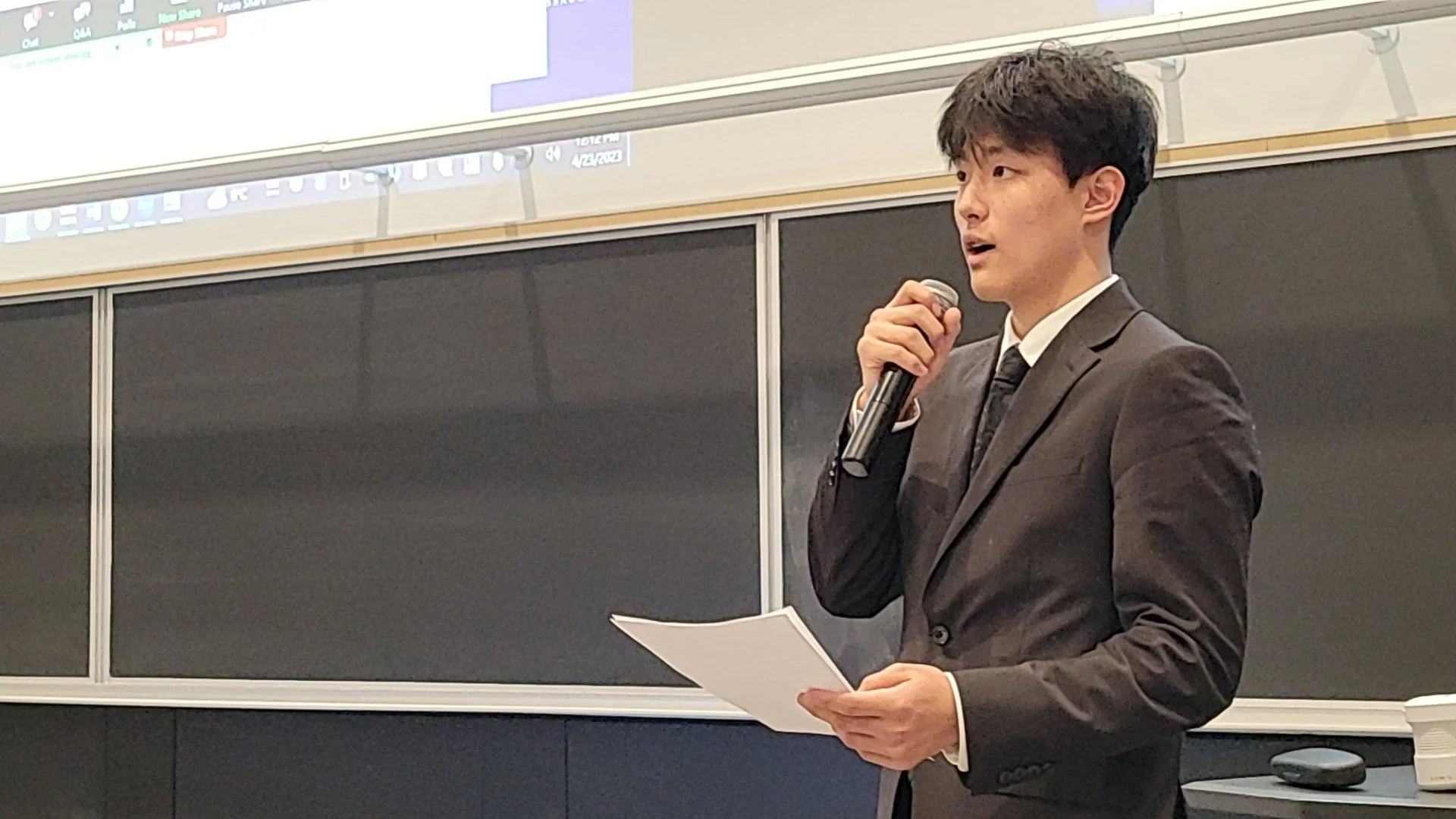尊敬长辈是中国文化传统的价值观
“金诺移民”祝贺《北美之声》创办一周年!祝各位朋友新年快乐!电话 647-201-7226
尊敬长辈是中国文化传统的价值观
《北美之声》创办人陈蓉编辑报道
来自:张瑞安
康龄中心宣传报道组按语:
张瑞安是加拿大生命教育和成长协会的学生,一个小记者,是一个普通的华侨后代。他在4月23日在密西沙加多伦多大学反歧视、反虐老演讨会上的演说,有观点,有分析很感人,现转发给大家。2023年4月30日。
大家早上好,我叫张瑞安。我是加拿大生命教育和成长协会的学生。在今天的演讲中,我将集中讨论为什么仇恨长老是不可接受的。在中国传统文化中,尊敬长辈是一种根深蒂固的价值观。这种尊重不仅限于自己的父母或祖父母,而是延伸到社会上所有年长的成员。这种价值观植根于这样一种信念,即老年人有更多的智慧和经验可以提供,因此值得尊敬和尊重。这种对老年人的尊重的一个方面,是拒绝基于年龄对他们的仇恨或歧视。中国文化在尊重和重视老年人的贡献方面有着悠久的历史,对他们表现出任何形式的不尊重或仇恨被认为是可耻和不可接受的。事实上,中国传统社会往往非常重视对社区老年人的照顾和支持。人们期望家庭照顾其年迈的亲属,社区往往有适当的组织,以确保老年人不被忽视或边缘化。此外,中国文化非常重视“仁”的概念,意思是“人性”或“仁”。这一原则鼓励人们以善良、同理心和尊重的态度对待他人,无论他们的背景或信仰如何。通过修习仁,中国老年人表明他们致力于创造一个和谐包容的社会,没有仇恨和歧视。在现代中国社会中,反对歧视老年人的观念仍然很强。有许多组织和倡议者专注于改善老年人的生活。年龄歧视在中国是非法的。年长的中国人经常表现出尊重他人的坚定承诺,即使他们不同意他人的观点。他们往往更有耐心、宽容和思想开放,不会怀恨在心或寻求报复。他们还倾向于强调宽恕与和解的重要性。他们认为,保持良好的关系和促进团结,必须放下负面情绪。总体而言,中国文化对老年人有着根深蒂固的尊重,这包括拒绝基于年龄的仇恨或歧视。这一价值观是中国社会今天仍然坚持的重要组成部分。要宽恕与和解,并认为必须放下负面情绪,以保持良好的关系并促进团结。谢谢!
Good Morning Everyone, my name is Ryan Zhang. I am a student from the Life Education and Growth Association of Canada. In today’s speech, I will be focusing on why anti-elder hate is unacceptable. In traditional Chinese culture, respect for elders is a deeply ingrained value. This respect is not limited to one's own parents or grandparents but extends to all older members of society. This value is rooted in the belief that older individuals have more wisdom and experience to offer, and therefore deserve reverence and deference. One aspect of this respect for elders is the rejection of hate or discrimination towards them based on their age. The Chinese culture has a long history of honouring and valuing the contributions of older individuals, and it is considered shameful and unacceptable to show any form of disrespect or hatred towards them. In fact, traditional Chinese society often placed great emphasis on caring for and supporting elderly members of the community. Families were expected to take care of their elderly relatives, and communities often had structures in place to ensure that older individuals were not neglected or marginalized. In addition, Chinese culture places great emphasis on the concept of "Ren," which translates to "humanity" or "benevolence." This principle encourages people to treat others with kindness, empathy, and respect, regardless of their background or beliefs. By practicing ren, older Chinese people demonstrate their commitment to creating a harmonious and inclusive society, free from hate and discrimination. The emphasis on anti-hate towards older individuals is still evident in modern Chinese society. There are many organizations and initiatives focused on improving the lives of the elderly, and age discrimination is illegal in China. Older Chinese people often demonstrate an unwavering commitment to respecting others, even if they disagree with them. They tend to be more patient, tolerant, and open-minded, and are less likely to hold grudges or seek revenge. They also tend to emphasize the importance of forgiveness and reconciliation. They believe that to maintain good relationships and promote unity, it is necessary to let go of negative emotions. In general, Chinese culture has a deep-rooted respect for older people, and this includes rejecting hatred or discrimination based on age. This value is an important part of Chinese society that still adheres to it today. To forgive and reconcile, and to believe that negative emotions must be let go in order to maintain good relationships and foster unity. Thanks!
小记者张瑞安发言记者陈蓉摄影
张瑞安等小记者参加康龄之歌合唱记者陈蓉摄影
………………………
近期要闻
75岁“AI教父”离职谷歌! 痛悔毕生工作,无法阻止人类AI大战
https://www.navoice.ca/posts/75aiai
劳工中断结束,联邦政府阐述恢复护照服务细节
https://www.navoice.ca/posts/y28dh3akg667yseetkfbsd7glzcjxx
回顾与展望 -加拿大高校文学社第二次会员大会圆满结束
https://www.navoice.ca/posts/-4
特鲁多称夏季通胀可能降至3%左右,如产生大规模失业政府会介入
https://www.navoice.ca/posts/3
联邦及各省区长者部长会议,共商如何支持加拿大老龄化人口
多伦多大学社会学系和康龄中心(care)联合举办反歧视防虐老研讨会
https://www.navoice.ca/posts/care
多伦多华裔媒体工作者协会第八届理事会成立
https://www.navoice.ca/posts/24slmta73rt7x6bxncyefezyrdh2kr
竞技麻将“突袭”多伦多,引百名好手同台竞技https://www.navoice.ca/posts/dx4tgzg7wb95hzym5wr4xp6zppcsse
挑战极限,电影《长空之王》将于2023年4月28日上映
https://www.navoice.ca/posts/2023428
大众汽车在加兴建新的电动汽车电池工厂,将创成千上万新就业机会
https://www.navoice.ca/posts/yplz9e8ktgkd8df3f5dapdxem5ydt4
【再欢聚,更美好】2023年多伦多“文化中国-水立方杯”中文歌曲大赛火热报名中
https://www.navoice.ca/posts/2023-5
欢迎订阅《北美之声》
《北美之声》网页版已经得到加拿大,中国,美国,香港,澳大利亚,台湾,新加坡,日本,韩国,英国,法国,德国,瑞典,意大利,西班牙,爱尔兰,比利时,卢森堡,荷兰,挪威,瑞士,丹麦,以色列,南非,巴西,智利,印度,澳门,越南,葡萄牙,泰国,沙特阿拉伯,匈牙利,新西兰等60多个国家的朋友支持。大家的鼓励是我们前进的动力,我们一起努力,传播正能量,为朋友送温暖送资讯!
........................
“金诺移民”祝贺《北美之声》创办一周年!祝各位朋友新年快乐!电话 647-201-7226
《北美之声》创办人陈蓉编辑报道
《北美之声》主编陈蓉: 加拿大资深记者,
英女王白金禧奖章(社区杰出贡献奖) 获得者
请支持原创,未经许可不得转载
更多精彩资讯请扫码关注并转发
广告推广请加 微信:rosechenlin
电话:647-201-7226





